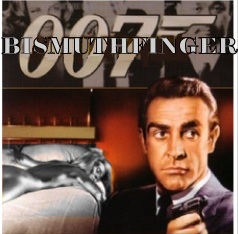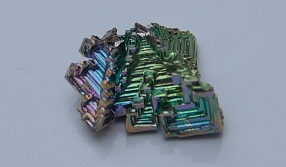Bismuth, nature's most uninteresting element
Seven incredibly boring facts about bismuth you will probably believe!

This will never happen
The Atlantic also has an interesting take on clickbait. You won't BELIEVE what they say about it! Or maybe you would! They claim that the basic principle of clickbait is what psychologists call the curiosity gap.
That idea originally came from George Loewenstein, who proposed the information gap theory which states that clickbait produces a feeling of deprivation that can only be relieved by learning a missing piece of information.
But the underlying thrust of the Atlantic article seems to be to convince everyone else to write more long, boring articles.
I'm way ahead of them. That's what I've been doing for years.

Bismuth
This means this article is not really going to be about bismuth. All you inorganic chemists will be disappointed, for which I insincerely apologize.
There are at least three types of clickbait:
- The crazy fact. Example: ‘You need a license to shovel snow in New Jersey.’ If you click on the article you find that, yes, you do, if you're doing it for money. You need a license because you're a vendor.
- The disgusting disease: The latest Internet advertising fad seems to be enticing the reader with stories about pus-filled skin lesions. Similar to stories about terrible car accidents: you might have one someday.
- The appeal to cuteness: Pictures of cute animals, especially furry ones in amusing poses, which evoke our parental instincts.
A lot of clickbait consists of lists. According to Wired magazine, scholars say that lists are ways of helping us face infinity and attempt to grasp the incomprehensible. This may be one reason so many people hate scholars.
My theory about clickbait is that people are so often disappointed at reading things they already know that they jump at the chance to learn something unexpected. Each new item we learn causes the release of a small dopamine reward in the brain. Clickbait is proof that, no matter how much our educational system tries to undermine it, we are programmed to experience pleasure at learning something new.
Even dogs are like this. I once gave my dog a book on quantum mechanics, and he ate it right up.
But enough of that. Here are seven facts about bismuth that will not change your life in any way.
-
Bismuth-209, the most common isotope of bismuth, is radioactive. But its
radioactivity is so low that its half-life is 2×1019
years—roughly 1,354,000,000 times the age of the universe. That means
if you start out with one pound of bismuth, it will take 1.27×1044
years for all of it to change into
thallium-205.
(You won't believe the amazing picture of bismuth they have at that link!). - Bismuth is only twice as abundant as gold, but it is so uninteresting and useless that in 2015 it was selling for just over four bucks a pound—3,759 times cheaper than gold. Nobody will ever make a movie called Bismuthfinger.
- According to Wikipedia, bismuth is more diamagnetic than any other metal, and it expands when heated, which is quite unremarkable indeed.
- Bismuth has a melting point of 271.5°C.
- The BiV/BiIII potential is +2.03 volts, making BiV one of the most powerful oxidants in aqueous solution, even more powerful than peroxodisulfate.
- Bismuth does not form a stable hydride. Like graphene, bismuth is electically insulating inside but conducting on the surface.
- If antimony is heated in air it reacts with oxygen to form antimony trioxide, Sb2O3. Yes, unfortunately I ran out of things to say about bismuth.
In the interests of scientific honesty, I should point out that bismuth is not actually uninteresting at all. I just wrote that to get you to click.

